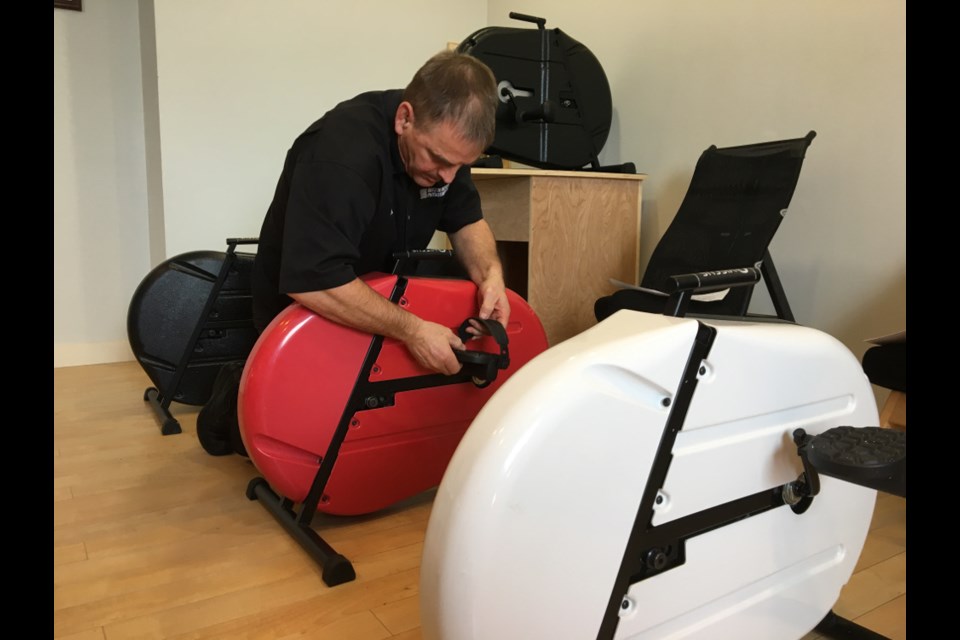After many years of design work and personal financial expense, Andre Riopel, well-known Sault physiotherapist and bicyclist, has perfected the latest version of his Viscus physiotherapy device for seriously ill or injured people.
After designing two prototype models, Riopel likes to call it his ‘Viscus 3.0’
With this version, Riopel feels he has reached perfection (or close to it).
“The people who this is aimed at are people who really need to move their legs more, a fairly large group of people with medical conditions in which movement is challenging, so it can be for people who need therapy after joint replacement, stroke, Multiple Sclerosis, Parkinson’s Disease, people who have kidney failure, peripheral vascular disease, diabetes, people who have difficulty doing anything strenuous,” Riopel told SooToday.
“I found a niche no one was covering, especially for that part of the population, a growing population that will benefit.”
The first 100 new Viscus units have been recently manufactured, with 25 units sold or rented, in use at Sault Area Hospital’s rehab unit, Extendicare Maple View, Extendicare Van Daele, the Northern Ontario School of Medicine (NOSM) and by a few local patients in their own homes.
Riopel hopes to see 300 units manufactured in the near future.
“As a therapist I never thought I’d see myself as a designer and manufacturer,” Riopel grinned.
“Am I an entrepreneur? I don’t see myself as Steve Jobs (the Apple co-founder).”
“When I see somebody use a product and get well, that’s what really makes me happy. As therapists, that’s what we do. We like to help people,” Riopel said.
“The secret to the Viscus (Latin for ‘an organ of the body’) is what I call an active flywheel.”
“There is no tension. It’s very easy to do because it’s like a rocking chair. It’s driven by momentum, so once the flywheel gets going the pedals keep going on their own and assisted by the flywheel effect,” Riopel said.
“The idea is pedalling to get circulation going, and you can do this for hours on end because it’s so easy.”
That seems to be the case.
Once you start pedalling, the machine takes over to the point where it becomes slightly difficult to stop the pedalling.
“The famous quote from my patients is ‘I can do this all day’ and that’s exactly the point.”
“The Viscus is currently being used extensively by Sault Area Hospital’s rehab department (SAH purchased several units from Riopel) for their neuro patients, patients recovering from stroke, people who have suffered fractures, any kind of condition where people are very weak and frail (in contrast to conventional exercise bikes, which healthier individuals can use anytime).”
Riopel said he has also been in discussion with SAH’s renal dialysis unit regarding the Viscus.
“With dialysis, you go to the hospital and you’re spending four hours a day, three days a week just sitting there waiting for the blood to be filtered but some studies show if you’re pedalling while on dialysis with a machine like this, it is thought to speed up the exchange of fluid.”
Riopel said this helps ease the sheer boredom and melancholy a patient feels while undergoing dialysis.
“People love it. They love pedalling while they’re on dialysis, so that’s an exciting project for us.”
Riopel said he would also like to see patients with agitated dementia allowed to use the device to achieve a sense of calm.
The NOSM campus in Thunder Bay, Riopel said, has been holding a clinical trial study of the Viscus for the past year, in which half a group of 60 patients who have undergone knee replacement surgery use Viscus units (which can be taken home), the other half given conventional rehabilitation treatment.
“They’re told to pedal three times a day minimum, as long as they want or can, and they’re monitoring things like range of motion and they’re finding people using the Viscus recover faster.”
The Viscus needs no electrical power cord or battery to operate, requiring only servicing of its bearings once every three years, which can be done by a bicycle shop.
“There are no buttons to push, no dials to turn, no tension to adjust,” Riopel said.
One of his patients uses a Viscus while working at her desk.
Riopel brought the current, improved Viscus to market after help from Sault College technicians and a professional designer in Toronto.
The help, Riopel said, is appreciated.
“It’s hard for a small business guy like me to compete with big firms…the designer in Toronto help me find the right manufacturers. Manufacturing can be a minefield.”
Viscus parts are manufactured in China and southern Ontario, with final assembly taking place here in the Sault by Riopel at his Back in Motion physiotherapy clinic on Second Line East.
Different types of Viscus pedals are available, depending on an individual’s patient’s needs.
